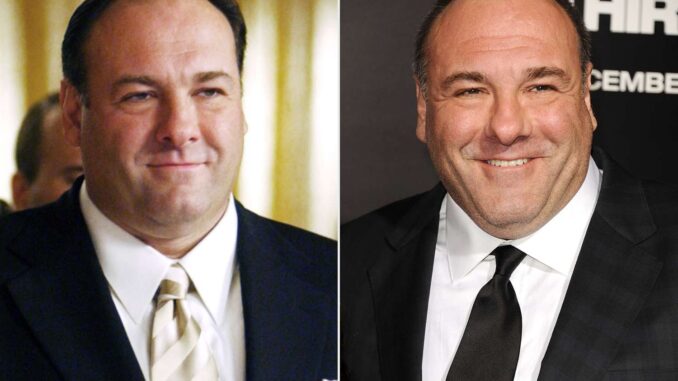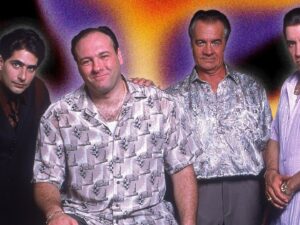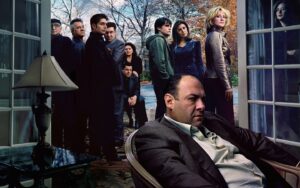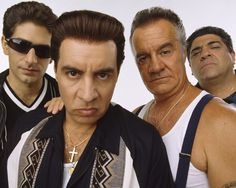
Two brief months separate the series premiere of The Sopranos on 10 January 1999 and the theatrical release of Analyze This on 5 March of the same year. So striking are the similarities between them that unwitting present-day viewers would be forgiven for assuming one influenced the other. Both focus on a made guy dealing with internal turmoil by going to consult a shrink at the possible cost of his alpha-dog standing within the capital-F Family, and both wedded humor with the ambient menace of the gangster genre.
David Chase’s small-screen drama took a more straight-faced approach to the subject than Harold Ramis’s film, but as a critically adored TV show and a blockbuster film, they were readily comparable cultural events at the time. (Chase and his writing staff would poke fun at the commonalities by the second season, too.) Marx said that history repeats itself first as tragedy, then as farce, but the turnaround’s rarely so speedy.
Twenty years later, and th

e mafia comedy as a form has all but died out in a world shaped by Tony Soprano. He exerted his influence on a generation of what critic Brett Martin termed “difficult men”, commanding antiheroes whose internal conflict held viewers captivated in spite of the more repugnant aspects of their personalities. Tony paved the way for Don Draper and Nucky Thompson firsthand – Mad Men’s Matthew Weiner and Boardwalk Empire’s Terence Winter were Chase’s closest disciples during the later seasons – and for Walter White and his ilk more indirectly. A sincerely held desire to reform perpetually warred with the basest impulses towards violence, selfishnesss1 and isolation. It made for some damned fine television, though critics have begun to wonder if it may have had a deleterious effect on the larger pop-political landscape.
But Tony seized the ongoing tradition of mob stories in particular as if it was an informant’s windpipe. When I think of the character’s descendants, my mind goes not to any of his successors on premium cable, but John Gotti as portrayed by John Travolta in last year’s eponymously titled biopic. He gives a performance of such awe-inspiring badness that it can never be forgotten, mumbling and growling through nonsense dialogue from behind a chicken cutlet’s worth of facial prosthetics. (His read of “They took my tit and put it on my face” is a thing of terrible beauty, like a disintegrating glacier.) It’s hard not to be reminded of Cleaver, the calamitously stupid slasher flick fictitiously produced by wannabe Hollywood player Chistopher Moltisanti in The Sopranos’ sixth season.
As the director, one could make the argument that Kevin Connolly, better known as Entourage’s diminutive self-starter E, is to blame for this. But in a more circuitously cosmic sense, it’s Tony’s fault.
The past two decades of gangster fiction have cultivated a small plague of bastard offspring that learned all the worst lessons from The Sopranos. On film and television, they emulated the brutality and brooding, but neglected to first establish the psychological foundation that made Tony Soprano worth investing in across eight years. Travolta’s Gotti, painted as an inveterate badass who can only affect the appearance of depth, feels like the creation of one of the aggrieved online commenters demanding Chase dispense with the therapy mumbo-jumbo and get back to the whackings. It’s the latest in a surprisingly long line of frowny-faced Cosa Nostra projects that attempted to pinch a bit of glory from Tony and Co without putting in the work.

Every network wanted their own Sopranos as soon as the show’s reputation as a full-scale game-changer had solidified, and a few went so far as to dip back into organized crime. NBC’s Kingpin made it six whole episodes into the life of Mexican narco trafficker Miguel Cadena (Yancey Arias) before executives gave it the hook, citing discomfort from the standards and practices department in portraying an immoral man in a positive light, even ambivalently. CBS’s even shorter-lived Smith contained trace amounts of Soprano DNA in its clumsy balance between the home and the illicit workplace, the casting of Ray Liotta in the lead clearly intended to evoke memories of his work in the gangster genre.
Though the most shameless attempt to ape the genuine article’s greatness are to be found on the silver screen, where the bit players have made a small, bizarre cottage industry of appearing in glorified knockoffs of the best work they ever did. The incompetent, flimsy Meet the Mobsters earned a watch from Sopranos loyalists by virtue of containing a performance from Vincent Curatola, HBO’s former Johnny Sack. Likewise, alleged capo of the Genovese family Danny Provenzano stocked This Thing of Ours, his misbegotten vehicle as writer-director-star, with such Sopranos regulars as Vincent Pastore and Frank Vincent. Having spent most of his working life portraying wiseguys, the latter actor was most likely a boon for the heist film’s obsessive fixation on verisimilitude. He strove to nail every last detail of the lingo and look, and in doing so, let characterization fall by the wayside.
He plays upstart Nicky Santini as troubled by the same dueling obligations as Tony, but his scowling and hunger for power come off as moody sociopathy without a compelling underlying rationale for the behavior. It’s unclear if we’re supposed to admire or sympathize with Nicky, but Provenzano clearly believes that he wins the audience’s favor simply by having to deal with the hassles of family. These failings illustrate a willful refusal to acknowledge the deep soul-sickness percolating just beneath the surface of the Sopranos; to believe Tony is even in the general neighborhood of “awesome” is to not get it.

Recent gangster entertainment exemplifies the crucial divide between those that worship The Sopranos and those that worship its main character. Chase’s program was conceived and conducted from start to finish as the exegesis of a man afflicted by chronic unhappiness, whose work in life was to shed the parts of himself he was afraid he didn’t know how to live without. Each of Tony’s therapy sessions launched a mini-broadside against chest-beating masculinity, against face-breaking as unhealthy recreation or backwards self-preservation, against his work as a necessary barrier to true self-actualization. The show cares for Tony and wants him to make progress – why else would America spend years holding its breath for a man with homicidal tendencies to turn over a new leaf – but keeps him at arm’s length.
By no means has Tony rendered mafia fiction a monolith of reverent stupidity. Films such as The Departed and American Gangster have gone their own way, related to Tony only in their sensitivity to the main characters’ vulnerable sides. (Matt Damon’s lace-curtain Irish rat wrestling with erectile dysfunction born from his guilt and self-loathing feels distinctly post-Sopranos.) But film-makers in the lower-rent fringes of the genre took plenty of cues from Chase under the impression that they would come off looking like Tony. In actuality, they bear a stronger resemblance to Matthew Bevilaqua, the Season 1 novice who tried to make a splash by putting out a hit on his superior. He thought respect could simply be taken instead of earned and, for it, he paid with his chest, stomach and head.
